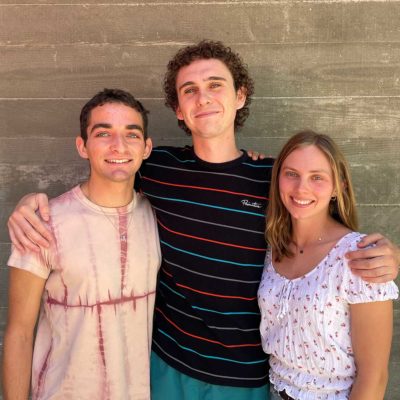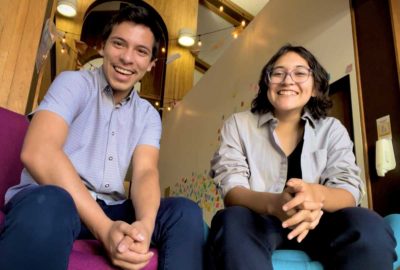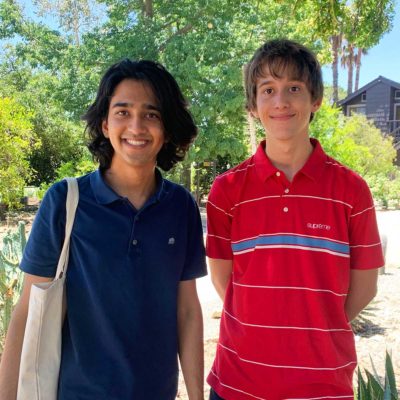Discover how the Hive taps into “the Pitzer brain” through out-of-the-box, hands-on innovation
 Jonah Ifcher ’24, Max Sweeney ’23, and Mahren Hudson ’23
Jonah Ifcher ’24, Max Sweeney ’23, and Mahren Hudson ’23
At the Hive, you fall in love with the problem, not the solution. A creative hub for The Claremont Colleges, the Hive taught this motto to its seven Summer Design Fellows—six of whom are Pitzer College students—as they pursued projects to promote student health in a variety of ways. From improving eating culture to helping students ground themselves in their environment to creating more inclusive sex education, the fellows are applying the Hive’s human-centered design to make a positive social impact.
Pitzer students Mahren Hudson ’23, Jonah Ifcher ’24, and Max Sweeney ’23 want to transform the eating culture on campus. The team is taking a three-pronged approach: 1) using first-year orientation to deconstruct fatphobia and diet culture; 2) establishing a peer support group for open conversations about food; and 3) promoting messages on social media and in dining halls so students feel comfortable eating what they want.
Currently, Hudson, Ifcher, and Sweeney are partnering with Pitzer to introduce new signage in the dining hall. They are also coordinating with Liz Ryan, a nutrition guidance counselor at Pomona College, to put together a speaker series with the radical, fat-positive activist Virgie Tovar to talk about healthy eating culture and relationships with food.
“Our initial idea was trying to ‘solve’ it, but there is not a direct solution for disordered eating and the struggle with eating in the first year of college,” said Hudson. “Our project shifted to an awareness campaign to encourage conversation, spread knowledge, and make students feel valid and supported.”
 Daniel Bonilla ’25 and Perce Alvarez (CMC’25)
Daniel Bonilla ’25 and Perce Alvarez (CMC’25)
Pitzer student Daniel Bonilla ’25 and Claremont McKenna student Perce Alvarez (CMC’25) looked at another aspect of health and wellbeing. Through “The Humanity Project,” Bonilla and Alvarez are creating sexual health resources and a safe space for conversations that are inclusive to all sexualities and gender identities, with a focus on marginalized and BIPOC youth who face unique struggles within the LGBTQI+ community. Through Instagram and TikTok, they cover sex education and invite queer youth to share their stories.
“Our current project is encouraging empathy through inclusive sexual health conversations,” said Bonilla. “We’re trying to create safe space where students are inclined to listen to each other’s stories and in turn, see themselves being represented in conversations they have historically been left out of.”
 Tommy Shenoi ’24 and Paul Grandchamp ’24
Tommy Shenoi ’24 and Paul Grandchamp ’24
Finally, Pitzer students Tommy Shenoi ’24 and Paul Grandchamp ’24 are addressing a form of cognitive bias called plant awareness disparity—a term that Grandchamp learned from a Pitzer class that refers to the inability to notice the plants in one’s own environment. Shenoi and Grandchamp are exploring the connection between students and natural spaces and are designing opportunities for placemaking, grounding, and environmental education.
They are pursuing a multitude of tactics, from a comic book with superpowered plants to a foraged snack menu to pair with educational workshops to Seedcache—a play on geocaching like in Pokémon GO, only instead of walking around looking for Pokémon, people are looking for native plants around The Claremont Colleges to collect guidebooks and seed packets to start their own gardens.
“We wanted to empower students and Claremont residents to recognize their landscape and alleviate our lack of groundedness and our stress,” said Grandchamp. “Going into the fellowship, Tommy and I had all these solutions, but the fellowship forced us to take a step back, and in the end that was super helpful to make more holistic designs.”
The throughline for all these projects is human-centered design, which lies at the heart of the Hive. Human-centered design is a liberal arts discipline whose core is the ability to empathize, define specific human needs, and generate ideas and prototypes to meet those needs. The Hive is a resource for students at all The Claremont Colleges, although Ifcher and Hudson aren’t surprised that a majority of this year’s design fellows are Pitzer students.
“I think the Hive is really tuned to ‘the Pitzer brain,’” said Ifcher. “It’s that outside-of-the-box, solution-driven design space. Pitzer students are especially wired for this and keen to get involved.”
Hudson concurred, saying: “Pitzer draws a lot of students who are down to get hands on and get a little dirty with things. The Hive works well with that.”
The Hive is really tuned to ‘the Pitzer brain.’ It’s that outside-of-the-box, solution-driven design space.
Jonah Ifcher ’24
The Hive boasts many creative spaces and supplies such as a sewing shed, a print lab, a recording studio, a wood shop, button makers, and endless whiteboards to draw and write on. Ifcher described the Hive as a “kindergarten for adults,” which in some ways fits the freedom of expression and learning that he experiences at Pitzer.
“Pitzer is the most fundamentally liberal arts college in that you can do finger painting and explain that there’s theory behind it,” said Ifcher. “You can intellectualize anything and be a lifelong learner.”